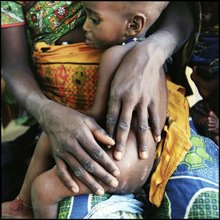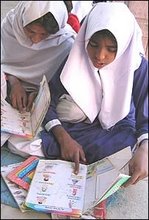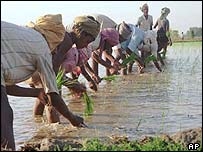PREAMBLE Demand for food and energy will jump 50% by 2030 and for fresh water by 30%, as the world population tops 8.3 billion. Climate change will exacerbate matters unpredictably. The United Nations Environment Programme (UNEP) predicts widespread water shortages across Africa, Europe and Asia by 2025. The amount of fresh water available per head of population will decline sharply during that time. The issue of food and energy security rose high on the political agenda last year during a spike in oil and commodity prices, but then slipped in priority with falling prices. At present, 30-40% of all crops are lost due to pest and disease before they are harvested, and future droughts and increasing salinity will affect growth and produce.
In this issue, we highlight the British Government’s new Food Strategy, released January 5th, 2010. It is a timely document, with implications for both the UK and the rest of the world.
UK GOVERNMENT’S NEW FOOD STRATEGY
A National Report with Global Implications
On January 5th, 2010, the UK Government released its new food strategy: Food 2030: How we get there is the first of its kind in over 50 years, and the UK’s first food security assessment. The report states observes that "the natural environment and the economy are intrinsically linked", and discusses issues ranging from how to create a sustainable food system locally and globally, to the challenges of rising global demand for food and how food contributes to greenhouse gas emissions (GHG).
"We need to think differently about food," said Prime Minister Gordon Brown in his Foreword to the report, produced by the Department for Environment, Food and Rural Affairs (DEFRA). 2008 was a wake-up call to world governments, as food prices rose sharply for the first time in a generation, provoking riots in some parts of the world. Many countries have reacted to protect food supplies in the face of climate change, a growing world population, and the spectre of “sudden shocks” such as natural disasters or price spikes.
[Ed Note: In Haiti, people are already reduced to eating mud cakes (clay with little added nutritional content); the January 13th 2010 earthquake will further exacerbate this extreme situation.]
As Secretary of State for DEFRA Hilary Benn states: “…the consequences of the way we produce and consume our food are unsustainable to our planet and to ourselves… we are at one of those moments in our history where the future of our economy, our environment, and our society will be shaped by the choices we make now.” Food production, he continues, must occur “without damaging the air, soil, water and marine resources, biodiversity and climate that we all depend on". For the UK, the aim by 2030 is to ensure that consumers are informed, can choose and afford healthy, sustainable food; that this demand is met by profitable, competitive, highly skilled and resilient farming, fishing and food businesses, supported by first class research and development. Food security is ensured through strong UK agriculture and food sectors, and international trade links with EU and global partners which support developing economies.
Globally, the report calls for a fairer international trade system that addresses import restrictions and subsidies, and the support of fair trade products, will work towards food that is produced, processed, and distributed to feed a growing global population in ways which:
o use global natural resources sustainably
o utilizes a low carbon food system which is efficient in using resources – any waste is reused, recycled or used for energy generation
o enable the continuing provision of the benefits and services that results from a healthy natural environment
o promote high standards of animal health and welfare
o protect food safety
o make a significant contribution to rural communities, and
o allow for global leadership on food sustainability.
Sustainability is a central theme throughout the document, but with the onus for this left mostly up to consumers. More government regulation and intervention may be required, given that many consumers will find it difficult to change food purchasing habits; otherwise, the agribusiness will find new ways to appeal to consumers without truly changing their activities. Related target areas:
education to help consumers know how and where food is produced and how to grow and cook it themselves;
programmmes to provide schoolchildren with opportunities to grow food;
the public sector would lead by example and purchase healthy and sustainable foods.
A broader understanding of sustainability is advocated that would address GHG emissions, water use, animal welfare, and supporting rural communities in the UK and in developing countries. The report suggests that the previous focus on ‘food miles’ was too narrow, as the transportation of food only accounts for 9% of the carbon footprint of a food product.
Food 2030 repeatedly links what is happening in the UK and the need to support communities in the developing world regarding resource use, improving technologies, purchasing fair trade products. Such endeavours could benefit communities by supporting farmers, improving infrastructure and supports, and mitigating the impacts of climate change. Or, such support could amount to another “Green Revolution”, benefiting the few and disadvantaging the many.
Sources:
HM Government. Food 2030: How we get there. Released Jan 2010. http://www.defra.gov.uk/foodfarm/food/pdf/food2030strategy-summary.pdf
Manitoba Alternative Food Research Alliance. Evaluating Food 2030, Jan 6, 2010. http://www.localandjust.ca/?p=432
Christine McGourty. Global crisis 'to strike by 2030'. Mar 19, 2009. http://news.bbc.co.uk/2/hi/uk_news/7951838.stm.
Tom MacMillan. Hilary’s contradiction casserole. Jan 5, 2010. http://www.guardian.co.uk/commentisfree/2010/jan/05/hilary-contradiction-casserole-can-worms.
Food Ethics Council. Food security. http://www.foodethicscouncil.org/topic/Food%20security. Accessed Jan 14, 2010.
Food Ethics Council. Food poverty. http://www.foodethicscouncil.org/topic/Food%20poverty. Accessed Jan 14, 2010.
Food Ethics Council. Hunger. http://www.foodethicscouncil.org/topic/Hunger Accessed Jan 14, 2010.
DISCUSSION: Looking back: how far have we really moved ahead? Defined at the 1996 World Food Summit, food security: “… exists when all people, at all times, have physical, social, and economic access to sufficient, safe, and nutritious food that meets their dietary needs and food preferences for an active and healthy life”. Leaders at that meeting committed to tackling hunger. By June 2009, however, the world’s hungry had increased to 1.02 billion people.
In the aftermath of high global food prices in 2008, amid growing concern about the effects of climate change on agriculture, much of the focus shifted to boosting food production. Yet, people go hungry because they cannot afford to eat rather than because there is no food available, and agricultural investment could exacerbate problems unless it is focused on reducing economic inequalities.
For examples: increasing meat and dairy consumption in the fastest growing economies will increase pressure on supplies; the roles played by financial speculation and biofuel promotion on the 2008 price hikes shows how developed country politics, consumption and spending power, not food production, adversely impact hunger globally.
Despite increasing choice and affordability of food in some countries, many people eat “what they can afford”, not what they “want” let alone what nutrition “experts” tell them they “should”. Food poverty means that an individual or household isn’t able to obtain healthy, nutritious food, or can’t access the food they would like to eat. This often results in lower nutrient intake, bad dietary patterns, hunger, low fruit and vegetable consumption and problems accessing food. The resulting poor diets lead to heart disease, obesity, diabetes and cancer, and inadequate levels of many vitamins and minerals. Obesity is now a sign of poverty in rich countries, as hunger is in poor countries.
Food poverty and economic poverty are linked. Policy-makers often view food security as a strategic issue of national security, dependent on logistics and global trade relations. At global level, how to feed a growing population that demands more resource-intensive diets, while tackling climate change and environmental degradation, are key questions of food security.
Envoi: According to a 2002 report from the UN Food and Agriculture Organization (FAO), global food production will continue to exceed population growth through 2030, but hundreds of millions of people in developing countries will remain hungry, and many environmental problems associated with agriculture will remain serious. Although growth in demand for food will be lower and population growth will slow, agricultural pressure on natural resources will continue to increase, albeit at a slower pace, and agricultural trade deficits in developing countries will increase drastically. Because most of those in extreme poverty live in rural areas, giving rural people better access to land, water, credit, health and education is essential for alleviating poverty and hunger, according to the report.
International trade plays an important role in achieving these aims, the agency says, calling for greater agricultural trade liberalization, better access to OECD (Organization for Economic Cooperation and Development) markets, the elimination of export subsidies and the reduction of tariffs. The FAO recommended openness toward international markets, investments in infrastructure, promotion of economic integration and limits on market concentration to make globalization work for the poor.
Citing Asia as a region where globalization has generally led to progress in reducing poverty, FAO notes that… " it has also led to the rise of multinational food companies with the potential to disempower farmers in many countries". "Developing countries need the legal and administrative framework to ward off the threats while reaping the benefits".
Source: World Agriculture: Towards 2015/2030 http://www.unwire.org/UNWire/20020820/28440_story.asp
FROM a Great Canadian and World Statesman
"A great gulf... has... opened between man's material advance and his social and moral progress, a gulf in which he may one day be lost if it is not closed or narrowed..."
Lester B Pearson
http://nobelprize.org/nobel_prizes/peace/laureates/1957/pearson-lecture.html
Friday, 15 January 2010
FOOD 2030 - A NATIONAL REPORT WITH GLOBAL IMPLICATIONS
Labels:
access to OECD markets,
agriculture,
cancer,
DEFRA,
diabetes,
FAO,
food miles,
food security,
global trade,
globalization,
gordon brown,
Haiti,
heart disease,
Hilary Benn,
mudcakes,
obesity,
UK,
UNEP
INSPIRATIONAL WELCOME ............................... from T.S.Eliot's "Little Gidding"
If you came this way From the place you would come from... It would be the same at the end of the journey...
If you came, not knowing what you came for, It would be the same... And what you thought you came for Is only a shell, a husk of meaning... From which the purpose breaks only when it is fulfilled If at all.


























